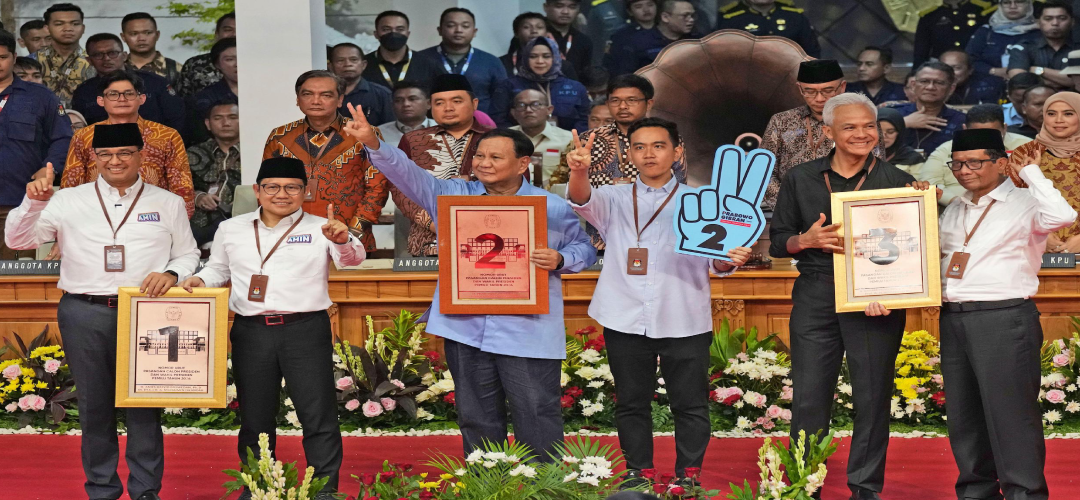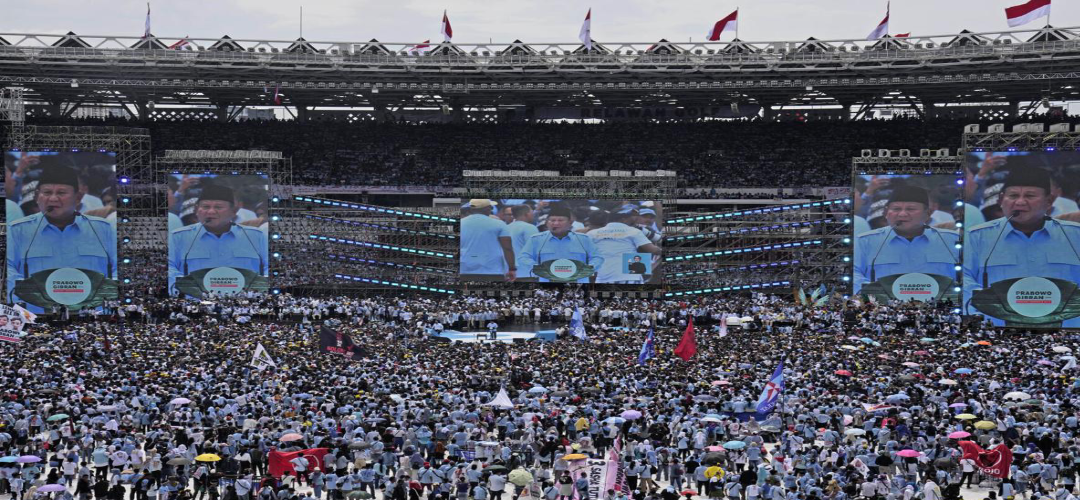Indonesia Elections: Power Continues?
February 24, 2024 | Expert Insights

The world’s third-largest democracy will vote to choose its president, government and legislature at all levels of administration. The outcome is not certain but it stands to have significant implications for the region.
Background
In a massive single-day election, Indonesian citizens will elect their president, vice president, and almost 20,000 representatives to the national, provincial, and district parliaments.
Since it became a democracy in 1998, it has held 5 rounds of legislative elections. While it has a vibrant, functioning electoral system, the archipelago nation struggles with many challenges in its democracy.
Firstly, the vestiges of Suharto’s 32-year-long authoritarian regime persist. Political, business, and military leaders who built their fortunes in this period continue to wield influence.
Jokowi Widodo, the incumbent and highly popular president, was an outsider who learned that he had to play by the rules of the elite old guard. He is term-limited from contesting the election.
The contestants include Anies Baswedan, former Jakarta governor who has drawn support from conservative Muslims. Earlier known as a progressive Muslim intellectual, he has swung towards hardline Muslims but now seems to be gearing towards mainstream and moderate Muslims again.
The second candidate is Prabowo Subianto, the former general and former son-in-law of Suharto. Subianto was president of the authoritarian regime from 1966-1998 and is associated with many high-profile human rights violations. However, he enjoys the backing of incumbent Widodo, who defeated him twice in the 2014 and 2019 elections and may draw from Widodo’s popularity.
The third candidate is Ganjar Pranowo, former governor of Central Java. Much younger than Subianto, he is backed by the most powerful party and is trying to position himself as a man of the people but many argue that he has been unable to build a clear identity.

Analysis
One of the key concerns for the nation’s democratic standards is the influence of dynasties. Many point out that Widodo is trying to retain influence: his son Gibran Raka is running on Subianto’s ticket for vice president despite being under the minimum age of 40. A constitutional court ruled to allow this in a controversial decision that sparked public outcry.
The youth demographic is key: more than half of the eligible voters are between ages 17 and 40 and around one-third are under 30. Candidates have been striving to target them through social media campaigns, including septuagenarian Prabowo who is trying to portray a lighter image.
A Subianto presidency would influence Indonesia’s relations with China, which had increased its investment under Widodo’s government. Like many Southeast Asian rulers, Widodo looked to maintain a balance between China and the United States. While actively cultivating Chinese aid and investment to improve the country’s poor infrastructure, he also widened defence cooperation with the US as his government grew wary of China’s activities in Indonesian territorial waters.
Subianto, a leading candidate and longtime nationalist, is likely to take a more assertive stance towards China’s maritime activity. However, he is also likely to expand defence cooperation with the US, as Widodo did and continue to strike a balance in light of US-China rivalry in the region. He is also likely to increase security ties with Japan, which has become more determined to build defence and economic ties with Southeast Asian states like the Philippines and Vietnam.
The other two contenders have voiced concerns about leaning too far out towards China to gain its funding support and called for diversifying Indonesia’s investment sources. However, they have not made clear how they plan to do so in light of the regional balance of interests.
Subianto’s authoritarian past could hamper cooperation with the US, as would his intention to maintain ties with all powers and not ally with one side in the increasingly polarized region.
Given the tense experience with the new Maldives leadership, India is keenly watching the Indonesian elections with Islamic extremism being a key concern. A Subianto victory may necessitate a more cautious approach from India given his nationalistic tendencies. A Baswedan win may also be a cause for concern given his previous links with hardline Islam.
Additionally, the elections could affect Indonesia’s role in the Association of Southeast Asian Nations (ASEAN), where Indonesia has held a significant position until recently: Widodo paid less attention to the organization. Reviving Indonesia’s strong influence in ASEAN will likely be on Subianto’s list as he is keen to gain the country a larger role in multilateral fora like the G-20 and Asia-Pacific Economic Cooperation (APEC) summits.
Assessment
- Subianto, as defence minister under incumbent Widodo, running on the same ticket as his son, and with his backing, is likely to follow a broadly similar approach in maintaining defence ties in the region. However, he may also introduce a more assertive foreign policy as he touts plans to enhance Indonesia’s influence.
- Irrespective of the outcome, India is committed to strengthening its ties with Indonesia as a part of its Act East policy and it looks to enhance defence and economic ties with the Southeast Asian nation.








Comments